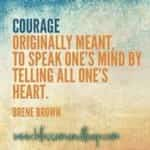By: David Moss, LMHC, CTT3
Outpatient Therapist, The Refuge – A Healing Place
During my internship in my Masters in Counseling program I was shown a video of a Ted Talk by Brene Brown that has shaped how I approach counseling to this day. While working on her doctorate Brene collected data on what connects us as human beings and she found an interesting theme, instead of people sharing what connected them to others they tended to talk about why they are disconnected from others. The deeper she got into the research she realized the main culprit of the disconnect…SHAME. Ironically, shame can be understood as the fear of disconnection: “am I worthy enough to be loved, to be known?”
“If people knew this about me, they would avoid me like the plague.” Most all of us, if we were brutally honest, would admit they have thought this very thought at some point in their lives, maybe even right at this very moment. Some of us, sadly, have this thought much of the time. This is probably the case with most of our clients here at The Refuge. If you asked all of the clients at The Refuge (or any other treatment facility) what messages replay in their heads that shame them you would probably hear statements like “I am stupid.”, “I am a failure.”, “I am worthless.”, “I am bad.”, “I am damaged goods.” If you asked them what are some good qualities they believe to be true about themselves, you may just hear crickets chirping. They probably will not have near as much to say about the positive affirmations that they believe as the negative, shaming statements that they replay over and over in their heads. The saying that it takes many positive affirmations to outweigh the impact of just one negative, shaming statement is an all too real truth in most of our lives. This is definitely true of the clients we work with at The Refuge.
Many, if not all, of the clients here at The Refuge have been severely impacted by trauma. Trauma is one of the main causes of shame in people’s lives. It is not surprising then that shame is a huge area of focus for our clinical team. This is often where I focus my attention with clients; the perceived belief that they are unworthy to be loved and known, really known. Abuse, abandonment and neglect produce shame by instilling in us the belief that we are “less than” and “not worthy”. This most often happens in a person’s childhood when they are developing their sense of worth. Notice I did not say their worth, but their sense of worth. A person, after internalizing these messages, then trudges on in life and is bombarded by messages that reinforce their erroneous, shaming beliefs they learned earlier. In other words they are re-traumatized. What is really tragic is that people who have been shamed earlier in their life often become magnets for further trauma either of their own making (self-sabotage) and/or they become targets of abusers or bullies. There is a way out, however.

My favorite saying by Brene Brown that I often paraphrase to clients is about the original definition of the word courage. When the word first came into the English language, the word courage came from the Latin root word cor, meaning heart.The original definition was to tell the whole story of who you are with your whole heart. To me the key to healing trauma in a person, and equally as important, to battling addiction, is to help a client share their whole story from their heart.
If we can get a client to do this, we have gone a long way towards breaking the bonds that keep them stuck in their personal prisons. Because here is the truth, everyone is worthy to be loved and known, you just have to make them believe it. The only difference between people who feel like they are loved and have a sense of belonging and those who do not (the shame-filled) is people who feel loved and have a sense of belonging believe they are worthy to be known. The question then becomes: Do you have the courage to be known?


